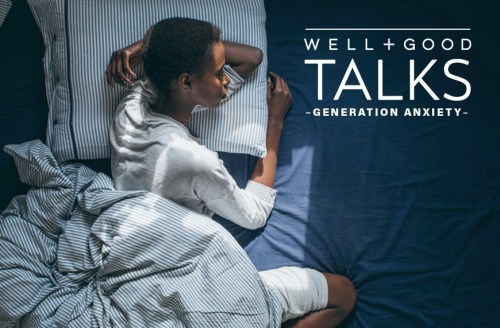These are the most common reasons you’re stressed—and it’s literally keeping you up at night
Spoiler alert: stress and sleep are interconnected. Here. experts weigh in on how you can reduce stress and improve sleep.

Stress is one of those really fun adult things we get to deal with, like taxes and the slow descent into thinking an Instant Pot is an exciting present to receive. In a recent survey of over 2,600 of Well + Good readers, 95 percent of you said you struggle with stress. The most common culprits: work and money. (Surprise, surprise.)
All that stress can manifest itself in insidious, health-harming, live-your-best-life-stopping ways. “While your body’s natural defenses are equipped to handle small and common periods of stress, chronic stress has been known to lead to high blood pressure, anxiety, obesity, and insomnia,” says Coral Arvon, LMFT, LCSW, and director of behavioral health and wellness at the Pritikin Longevity Center + Spa. “Chronic stress has even been attributed to major illnesses including heart disease, research has found.”
But the most common negative effects you feel from stress are related to sleep, according to our survey: 63 percent of you said your stress is causing trouble sleeping, and 79 percent said it’s making you feel fatigued. (Related: same.) I got the scoop on how stress messes with your sleep and energy levels (spoiler, it’s in some pretty major ways). Plus, the experts weighed in on exactly what to do about it, because being stressed and exhausted in perpetuity is no way to live.

Stress, sleep, and why you feel so effing tired
The whole being too stressed to sleep thing? It’s actually a pretty BFD. “Research shows us that stress can truly impact our sleep cycle in profound ways,” Christie Tcharkhoutian, LMFT, of La Vie Counseling Center in California, says.
Mentally, it’s difficult to turn your brain off after a day of stress. “When people are stressed out, they may spend more time thinking and worrying,” Sari Chait, PhD, Massachusetts-based clinical psychologist at Behavioral Health and Wellness Center, explains. “It’s quite common to do this at bedtime and the stressful thoughts can keep you awake. This difficulty sleeping can, in turn, make you more tired.” Basically, it’s that feeling of lying down to go to bed, and then suddenly your brain decides to replay every conversation you had that day/for the past five years and analyze if people liked you.
That tossing and turning is only the tip of the stress iceberg, though. When you’re stressed, you have difficulty entering REM sleep because your body is in “fight-or-flight” mode, Tcharkhoutian says. REM sleep is important because it’s the part of your sleep cycle that helps you wake up refreshed. “When you’re stressed out about your day, your work, or your relationship, your body cannot transition smoothly into the necessary parasympathetic nervous system functions it needs to decrease the cortisol levels in the blood and fall asleep,” she explains. So basically, your body is so on-edge that it can’t fully fall asleep—meaning, your body doesn’t get a chance to fully rest and repair (and you wake up feeling like garbage).
Physically, stress causes all your muscles to tense up—like, your shoulders are up to your ears, your jaw is clenched, the works. This is physically tiring for your body. “Just being in a state of stress is exhausting,” Dr. Chait says. Amen.

So what can you do?
You know how when you’re stressed and someone tells you to just calm down you want to either put your face in a pillow and scream or roll your eyes so hard you fall out of your chair? Yeah. Not helpful. That said, there are processes and actions you can do that will help you achieve this seemingly mythical Zen-state.
“If you struggle with letting go of stress before sleeping, it’s important to treat the process of preparing for sleep as sacred,” Tcharkhoutian says. “This includes ‘turning off’ a lot earlier than you may be used to, logging out of your email at least two hours before you want to sleep, not watching television or engaging in any stimulating activities in this time period as well.” Yes, it’s a bummer to have to stop bingeing Making a Murderer right before bed, but your health will thank you.
Tcharkhoutian says to replace that with reading or writing in a journal. These activities, she explains, begin to activate your parasympathetic nervous system, which helps prepare you for sleep and distances you from stressful triggers. Journaling helps you become reflective rather than reactive (key for minimizing stress), and writing a to-do list can help “externalize worries that may feel like they can’t escape the ruminating of your own mind,” she explains.
Dr. Chait also recommends writing down what is stressing you, then spending a few minutes writing out possible solutions and pros/cons. “Sometimes just trying to solve a problem, even if it doesn’t work, can help decrease stress levels,” she explains.
If you’ve tried all of this and none of it is helping you sleep (or deal with your stress), Dr. Chait recommends seeking out a therapist for help. For insomnia specifically, she says that cognitive behavioral therapy is considered the most effective treatment—it’ll help you recognize and change behaviors and beliefs that mess with your sleep and replace them with healthier sleep habits. Because really, you should only be missing out on sleep for a fun reason (ahem, hot Tinder dates), not because you’re stressed AF.
Bookmark this page—here are all the questions you should ask your doctor before starting a new mental health medication. And, the difference between being stressed and anxious, explained.
Sign Up for Our Daily Newsletter
Get all the latest in wellness, trends, food, fitness, beauty, and more delivered right to your inbox.
Got it, you've been added to our email list.










